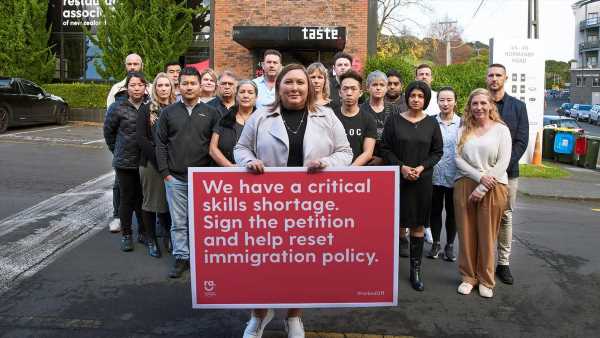An 11th hour announcement by Immigration Minister Kris Faafoi took some heat out of irate hospitality business owners who accuse the Government of leaving their industry in crisis due to critical staff shortages.
Faafoi issued an embargoed press release last night, announcing an extension to working holiday and Supplementary Seasonal Employment (SSE) visas shortly after an online petition organised by the Restaurant Association went live on their website.
Business owners, led by the association, today launched a two-month “Reset” campaign aimed at forcing the Government to focus on immigration issues which they claim will cause more cafes and restaurants to close if left unresolved.
The minister announced that around 10,000 working holiday and SSE visias due to expire this year would be automatically extended for six months to help with labour shortages. SSE visa holders will be able to work in any sector.
Restaurant Association chief executive Marisa Bidois said last night that after months of lobbying the assoctaion was pleased that the Government was finally listening.
“However this doesn’t go nearly far enough. Most of the temporary visa holders are on essential skills work visas and there is no plan to extend these.”
Staff shortages across the sector in most regions had reached crisis point, she said.
“We have businesses across the country reducing hours, changing decades-long operating schedules, and closing whole services, in order to cobble together a semblance of operations and give their existing teams a break.”
The association’s online petition calls for immigration policy changes, and urges business owners to download letter templates from its website to send to MPs and ministers.
Cafe and restaurant owners have backed the campaign which will include a “two-minute lights out” initiative to draw the public’s attention to the issue. Others say they feel so strongly about the issue they will close their businesses for specific periods of time to support the campaign.
The association is critical of the Government’s intention to restrict immigration, saying more than 90 per cent of businesses wanting to recruit mid to senior-level staff have reported difficulties filling the roles this year.
“With the Government’s recent immigration reset announcement there is palpable fear that their approach to ideological-based policy could see our industry scythed once again. But this time it will be Government-induced,” Bidois said.
“We were experiencing a skills shortage prior to border closures, but the sector is in the midst of a skill shortage at levels never seen before.”
Pre Covid-19, between 25 per cent and 30 per cent of the industry’s 136,700 workers were on temporary work visas, rising to nearly 60 per cent in some areas. The industry currently had about 15 per cent of the workforce on temporary work visas.
“We stand to lose 15 per cent of our total workforce with no viable replacement.”
The association had a number of recruitment and training programmes under way with the support of the Ministry of Social Development but the skills gap was now too large, Bidois said. The sector desperately needed the Government to find workable solutions that would keep businesses operational.
“Our migrant workforce is a source of valuable expertise, bridging both local skill gaps and staffing shortfalls.”
Conversations with the Government had previously “led nowhere”, she said.
The Reset campaign wants the Government to also extend the number of working hours permitted for those on student visas, put the planned median hourly wage threshold of $27 an hour (due to rise next month) on hold, and allow border exceptions for critical workers where there is a proven need.
Losing workers was enough to make a difference so big that it could affect businesses in catastrophic ways, Bidois said.
The campaign was designed to draw the Government’s attention to the extent its immigration policy was affecting the industry.
“We have been experiencing a skill shortage for some time and with our closed borders it really has heightened the issue for the industry.”
The shortage was across the board but particularly with mid to high-level positions. A Restaurant Association conducted in May, covering the months of March and April, revealed that on a national level, more than 90 per cent of business owners searching for mid-level and senior staff had difficulty filling the roles. Of those looking for junior/low-skilled staff, 73 per cent reported difficulty.
The figures were even higher in Auckland with 96 per cent of business owners finding it hard to secure senior staff, 100 per cent reporting difficulty in attracting mid-level staff and 87 per cent for junior staff.
Queenstown’s figures – 100 per cent, 78 per cent and 100 per cent – were even worse.
Asked if business owners had noticed more Kiwis applying for roles in the previous two months, 86 per cent said no. In the Nelson/Marlborough area, 100 per cent of business owners said Kiwis had not applied for jobs.
Members reported not getting any replies to advertisements for staff and some said they had been forced to move to considerably higher rates for chefs to stop them going elsewhere.
Another said: “Our best bet at the moment is recruiting inexperienced students as they are the only people available.”
One Bay of Plenty restaurateur said he had closed his business after 25 years after advertising unsuccessfully for a maitre de and sous-chef for months.
Bidois said it was critical that the industry, currently recovering from the past 12 months of reduced trading, did not have growth further curtailed due to staff shortages.
Source: Read Full Article

/cloudfront-ap-southeast-2.images.arcpublishing.com/nzme/4W6ZJIWCATHGIMA6UFVCPOGE3U.jpg)
/cloudfront-ap-southeast-2.images.arcpublishing.com/nzme/P4LGIR3O45DQSUG5DQPGDE7UOI.jpg)